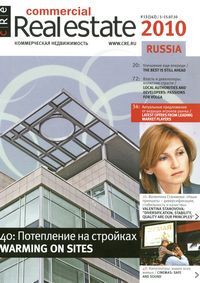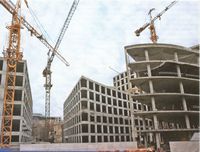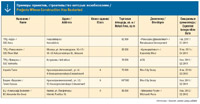Warming Starts on Sites?

Muscovites knew the fact that the crisis stopped many construction projects not only from the press. We all got used to see construction running day and night, but suddenly in the fall of 2008 this process stopped with abandoned construction sites, cranes and rusting timber. However, in the summer of 2010 we can see some of those previously frozen projects resuming. Can we talk about a global "warming" in this case?

When the crisis came to Russia, almost all the banks stopped financing construction projects. As a result, developers, most of which were very dependent on borrowed funds, were forced to adjust their plans in the light of new funding opportunities (or no funding opportunities at all). According to Cushman & Wakefield, in the fall of 2008 there were about 3.5 million sq m of office space at various construction stages. When the crises started approximately 1 million sq m were frozen or suspended. As for retail space, of the total 2 million sqm under construction in late 2008, 15% of projects stopped (about 300,000 sqm).
However, developers rarely make public that their construction projects stopped; usually they announce that the construction slows down. However, it often looks like the construction is really frozen. "In the retail real estate segment, there are practically no examples of frozen projects," believes Alexei Mogila, Director of Commercial Real Estate Department at Penny Lane Realty. "During the last two years some of retail real estate projects were delayed in time and their deadlines were postponed, in some cases for a couple of months, in other cases for a year or more." By the end of 2009, a number of retail real estate projects were scheduled to finish. These are such projects as the Mall of Russia, Gagarinsky, Hudson, Marcos Mall, Vegas, etc. A number of announced earlier in 2008-2009 projects successfully opened in 2010, namely Viva shopping center in Butovo, Vegas center located at the intersection of the Moscow Ring Road and Kashirskoe highway, and the Rechnoy shopping center on the Festival street. Other shopping centers are currently at various development stages.
As for the warehouse segment, according to Praedium Oncor International, there are approximately 800,000 sq m of frozen projects, which is comparable to the growth for 2009. "All major projects that were initiated in the warehouse real estate segment have been completed. They have not been frozen," argues Christopher Van Riet, Managing Director, Giffels Management Russia. "Developers stopped only small projects, for example we know about a frozen warehouse project located on the M-4 highway. According to the developer, the construction of the Southern Gate project initiated by Giffels was finished on time, despite the crisis.
As for the hotel segment, there are not so many cases when projects stopped in the middle. The most notorious of them is the Moskva hotel, the project deadline for which was postponed many times and is now scheduled for 2012. "Many projects that were realized during the crisis continue one way or another. Depending on a stage of realization, many of them have been successfully realized," comments Angelica Normann, Head of Consulting Services, Hospitality and Entertainment, Russia and CIS, Ernst & Young. "The construction schedules were many times changed, but new hotels opened." On the other hand, according to Ms. Normann, nearly all hotel projects "on paper" have been stopped. The most famous of them are the Four Seasons Hotel on the Golden Island, Gostinitsa Raffles Chizhevskoe Podvorye located on Nikolskaya Street, a hotel in Moscow-City (AFI Development), and Novotel in Gostinny Dvor.
Quick defrost
Today, despite the above-said optimistic trend, there are not so many examples of restarted projects in the market. On the other hand, not so many companies announce the halt of construction.
AFI Development was one of the first companies to announce that it would restart its three projects: phase 4 of the Aquamarine office project at Ozerkovskaya Embankment, a B+ business center at Paveletskaya Embankment and a nursing home in Zheleznovodsk. We cannot talk about the restarting of another large-scale project of the company – the reconstruction of Tverskaya Zastava. "We never stopped this project because it has always been one of our key priorities. The fact that we many times delayed the project schedule has nothing to do with the ongoing crisis, as we are facing some technical problems," says Natalia Ivanova, Head of Public Relations at AFI Development. Retail and entertainment zones of this mixed-use center with a total area of 570,000 sqm near the Byelorussian Train Station will be inaugurated in 2012. In the same year, a system of road junctions will be put into operation. Office and hotel real estate will be built built by 2012 as well.
Another landmark of the real estate market is the resumption of the Imperia Tower project that the Mos City Group company is now selling in the Moscow City. "Despite the fact that during the crisis there was a serious slowdown in the construction process, it had little effect on the completion of this project," comments Dmitry Chertkovsky, Managing Director of MCG. "In pre-crisis times, this construction was carried forward ahead of schedule." The inauguration of the Imperia Tower with a total area of 300,000 sqm (including office and hotel real estate, a water park and a parking lot) is scheduled for late summer of 2010. Another project of the company in the Moscow International Business Center is the Eurasia Tower. The developer plans to finish it by 2011.
A good example is the City Palace project that is implemented jointly by Snegiri and Inteco in the Moscow City. By 2012, the developers expect to finish phase 2 of the project that belongs to Citer Invest B.V. The project includes a transport terminal, retail and hotel real estate. "The first project came alive when the first wave of fear went away. This trend primarily concerns the projects at the final stages of implementation," says Olga Pobukovskaya, Deputy Director of Office Real Estate Department at Colliers International.
"The first large-scale "unfrozen" project was phase 2 of the Federation Tower that belonged to Mirax Group. The list of other important projects also includes a business center in Oruzheiny Pereulok that belongs to Don-Stroy, the Olympia Park that Horus Capital resumed in March of this year, a multifunctional complex called Legenda Tsvetnogo (Capital Group) that was suspended for a few months and is being actively built now, and so on.
Capital Group reports that it has never frozen any of its projects. "In the first quarter of 2009, we actually reduced our construction works at Legenda Tsvetnogo, but this fact related to some necessary changes that we were to make to initial design documents, as we needed to decide on a global hotel operator and a well-known restaurant chain," comments Piotr Isaev, Director of the Commercial Real Estate Department at Capital Group. "In the spring of this year we made all necessary changes and restarted the project in full."
Horus Capital confirmed the fact that the company suspended construction on the Olympia Park, reporting that it was connected with optimization of the company`s expenses and a general unfavorable situation on the commercial real estate market. "In early 2010, we first saw an increasing demand of tenants for high-quality facilities, backed by a number of real deals that allowed us to resume work on the project," the company says.
However many projects that were initiated before the crisis stopped. "If we talk about retail real estate, not so many previously frozen projects are now in progress, although there are some examples of renewal. Some companies announce their intention to restart financing retail construction projects," says Olesya Cherdantseva, Head of Market Analysis, Retail Real Estate Department, Jones Lang LaSalle. "The fact that in Moscow the process of new property inauguration is still very slow can be explained by a huge volume of premises slated for construction in 2010-2012 (1.3 million sq m). Even in the currently recovering market, it will be difficult to market such huge volumes of premises. This is one of the reasons why developers are in no hurry to restart their previously frozen projects. In addition, there remains the problem of financing as only large market players have access to sources of finance. In many cases, the interest rates are still far from being attractive.
"Since the beginning of this year, our company restarted receiving requests from clients interested in their projects that were frozen during the crisis. Now the owners are considering their implementation," explains Tatiana Klyuchinskaya, Director of Retail Real Estate at Colliers International.
The question is not only in fund raising to keep on building the properties; developers also need to be confident that their projects will be attractive for potential buyers and retailers." Talking about examples of actually "unfrozen" shopping centers, Ms. Klyuchinskaya cites the mall project in Sochi that is built on the site of a former concrete plant. Another project is Hudson in Moscow that is likely to be unfrozen and open before 2012.
As for warehouse and hotel real estate projects, the market still has not heard about real cases of projects being restarted. "Warehouse projects that were suspended as a result of the crisis are still put on hold today. A sharp decline in demand forced most of the developers to abandon speculative projects," comments Olga Pavlik, Head of Research and Analytics at Praedium Oncor International. "Only the largest companies can now introduce new warehouse facilities while other developers are considering only options that are available for a specific tenant or buyer.
Overcoming barriers
The main reasons for stopping construction are the lack of finance and uncertainty of a future demand, which, in turn, keep the banks from granting new loans. "Today, projects are kept alive due to successful refinancing and involvement of strong financial institutions," says Kirill Zaitsev, CEO and Managing Partner of Bluestone Group. "Unfortunately, we cannot talk about these cases as a market trend yet. Most of the projects under construction are supported by financial and government structures. These projects continue only because of administrative support and financing that comes from Sberbank, VTB, and Alfa Bank.
VTB was the first bank in Russia that opened a so-called "crisis credit line" to Mos City Group. "Last spring, we agreed with VTB to get a bank loan for 4.5 billion rubles, which was enough for us to finish the Imperia Tower," says Dmitry Chertkovsky. "In those really difficult times, it was very important for us to find one of Russia`s largest banks as a financial partner who saw the potential in our project. Naturally, the interest rate was high enough (18%), and they took our property as collateral."
Due to another loan issued by VTB it became possible to keep working on section 11 of the Moscow City: Citer Invest B.V. who builds a transport terminal there has agreed on the syndicated loan issued by VTB and Turkish IS Bank for $190 million in the spring of this year. In early summer, Sberbank announced that it would finance the Federation Tower project. Due to general market stabilization along with financing obtained from Sberbank, AFI Development managed to proceed with a number of its projects. "We look at the market and the demand for our projects. We see a growing demand that allows us to continue construction. We also see that in many cases it became possible to get bank financing – mostly from major domestic banks," the company reports.
"First, developers managed to solve the problem of financing to proceed with their projects," explains Andrei Malkov, Analyst of the Research Department at Cushman & Wakefield. "With regard to the market demand, it has started growing only recently giving the chance to several construction projects to continue. According to Mr. Malkov, the other 3-4 projects will be unfrozen by the end of this year.
According to Olga Rybakova, Head of Market Analysis, Office and Warehouse Real Estate Department of Economic and Strategic Research at Jones Lang LaSalle, the first projects to come to life are those that were frozen at the stages of active development when buildings were partially built. "In our case, all projects were in the final construction stages; therefore it takes less money and efforts to proceed with them compared to brand new projects," confirms Natalia Ivanova, representative of AFI Development.
The market experts point out that the projects that did not start when the crisis came are not in progress now either. At the same time, one of the projects "on paper" that started during the crisis is known by the market: this is a Class B+ Trio business center located on 8 March Street. MR Group as the project developer has signed a number of barter deals with contractors, giving them office spaces and offering small areas in the business center for sale. Based on this scheme, the company has managed to proceed with this project without any additional money that Gazprombank refused to pay. This method of investment nowadays seems quite successful.
Future of unfrozen projects
Experts agree that one day there will be no more frozen construction projects in Moscow. "A holy place is never empty. Russia`s capital is a huge market that will always be in demand, so it is unlikely that frozen construction sites exist here forever. Another thing is that some of the projects will change owners," says Alexei Mogila. "The most successful by concept and better located projects will be the first to continue," explains Andrei Malkov. "In case we see some of today`s frozen projects in Moscow in, let us say, five years from now, such cases will not be that many."

On the other hand, it is not quite obvious that we will see mass construction projects unfrozen within a short time. "There are a lot of projects with uncertain perspectives. Not many companies have successfully restructured their debts and solved the problems of new financing needed to proceed with construction," argues Piotr Isaev. "Moreover, it is no secret that banks have become owners of a substantial number of projects at different stages of construction. Many of them will be completed no earlier than they change owners."
As for projects on paper, their prospects depend on the characteristics of the property, location of the site, concept, etc. "Many developers had to change the concept due to the lack of demand. Some of them even postponed their implementation for an indefinite time," says Evelina Pavlovskaya, Vice President of Consulting at GVA Sawyer. "The prospects for many projects are uncertain, especially in the form these projects were initially announced before the crisis."
Автор: Olga Lobacheva
Commercial Real Estate №13 (142), July, 1-15 2010

